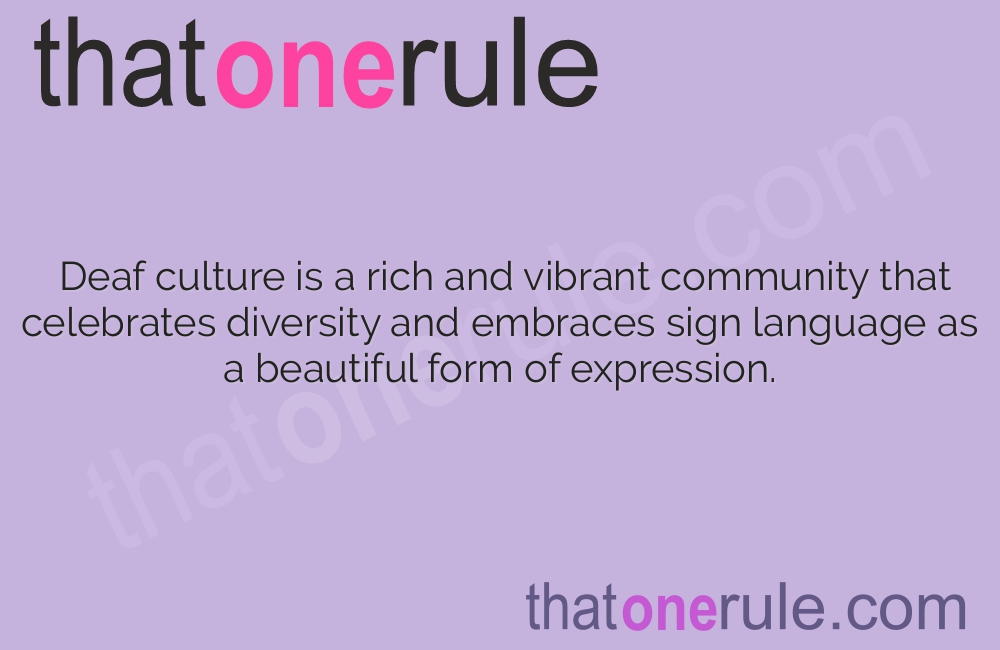

Deaf culture is a rich and vibrant community that celebrates diversity and embraces sign language as a beautiful form of expression.
Deaf culture is a rich and vibrant community that celebrates diversity and embraces sign language as a beautiful form of expression.
Deaf culture values inclusion and equal access to information and services.
Deaf individuals have their unique customs and traditions that contribute to their cultural identity.
Sign language is not just a mode of communication for the deaf; it is the foundation of deaf culture.
Deaf art and literature play a crucial role in preserving and promoting deaf culture.
Deaf culture promotes the empowerment of deaf individuals and challenges societal misconceptions about deafness.
Deaf culture places great importance on visual communication, facial expressions, and body language.
Deaf culture is not limited to deaf individuals; it includes their families, friends, and allies who support the deaf community.
Deaf culture celebrates deafness as a difference, not a disability.
The deaf community has its unique social norms and etiquette that foster inclusivity and respect.
Deaf culture has its own sense of humor, incorporating visual puns and clever sign language jokes.
Deaf culture values bi-biculturalism, embracing both the hearing and deaf worlds.
Deaf culture advocates for accessible technology and resources that enhance deaf individuals’ independence.
Deaf culture has a strong sense of community, with social clubs, organizations, and events specifically tailored to deaf individuals’ needs.
Deaf culture recognizes the historical struggles and achievements of deaf individuals and their fight for equal rights.
Deaf culture celebrates the diversity of deaf experiences, emphasizing that no two people’s experiences of deafness are the same.
Deaf culture encourages deaf individuals to take pride in their unique identity and share their stories and experiences.
Deaf culture values tactile communication, such as touch signals, vibrations, and tactile sign language.
Deaf culture emphasizes the importance of deaf role models and mentors who inspire future generations of deaf individuals.
Deaf culture recognizes the value of deaf education, advocating for quality educational opportunities for deaf children.
Deaf culture advocates for the inclusion of sign language in schools and educational institutions.
Deaf culture celebrates achievements in the deaf community, such as successful deaf entrepreneurs, artists, and athletes.
Deaf culture promotes deaf-friendly spaces, where deaf individuals can feel comfortable and access services without barriers.
Deaf culture encourages the preservation of deaf history, including significant events and figures that have shaped deaf culture.
Deaf culture recognizes the importance of accessibility in public spaces, such as captioning, visual alarms, and sign language interpreters.
Deaf culture promotes bilingualism, where deaf individuals are encouraged to be proficient in both sign language and written/spoken languages.
Deaf culture celebrates the resilience and strength of deaf individuals who overcome obstacles and create a fulfilling life.
Deaf culture encourages deaf individuals to advocate for their rights and challenge discriminatory practices.
Deaf culture emphasizes the importance of deaf-friendly healthcare services, including sign language interpreter services and culturally sensitive healthcare professionals.
Deaf culture recognizes the unique challenges faced by deaf individuals in the workplace and advocates for equal opportunities and accommodations.
Deaf culture values storytelling and oral traditions within the deaf community.
Deaf culture seeks to dismantle stereotypes and misconceptions about deaf individuals and their capabilities.
Deaf culture fosters a sense of belonging and community, where deaf individuals can find support, inspiration, and friendship.
Deaf culture encourages inclusivity in media representation, promoting diverse deaf characters and stories.
Deaf culture celebrates achievements in deaf education, such as the establishment of deaf schools and universities.
Deaf culture recognizes the importance of deaf parents in raising deaf children, providing them with a strong sense of identity and belonging.
Deaf culture encourages the use and recognition of regional sign languages and variations within the deaf community.
Deaf culture values deaf activism, advocating for policies and legislation that protect the rights and well-being of deaf individuals.
Deaf culture promotes healthy communication within the deaf community, emphasizing the importance of active listening and empathy.
Deaf culture recognizes the intersectionality of deafness with other aspects of identity, such as race, gender, and sexuality.
Deaf culture celebrates the achievements of deaf pioneers in different fields, breaking barriers and inspiring future generations.
Deaf culture acknowledges the challenges faced by deaf individuals in emergency situations and advocates for accessible emergency communication.
Deaf culture encourages deaf individuals to embrace leadership roles and actively participate in decision-making processes.
Deaf culture values lifelong learning and continuing education for deaf individuals, promoting personal growth and development.
Deaf culture recognizes the significance of deaf sports and competitions, providing a platform for deaf athletes to excel and showcase their abilities.
Around the world, coffee enthusiasts enjoy Monin coffee concentrate since it is a multipurpose product. Conveniently combining…
The Importance of Choosing the Right Shower for Your Bathroom Renovating your bathroom can be…
Usain Bolt holds the record for the fastest 100-meter sprint in history.Bolt was named Sportsman…
Love is in the air... and it smells suspiciously like chocolate!Roses are red, violets are…
Life's a beach, take a picture and relax.Sun, sand, and salty kisses. That's what beach…
Hungary is home to the largest thermal water cave system in the world.The Rubik's Cube…